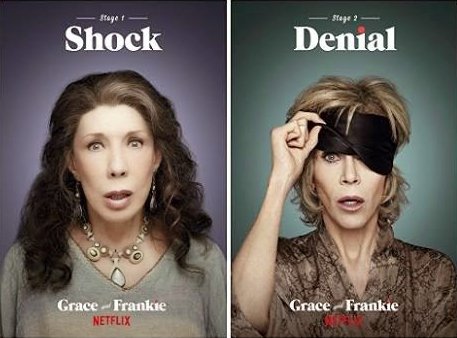Grace and Frankie, Silver Divorce, and (Special Guest and Pop Culture Wiz) Meghan’s Mom

It’s summer, and, of course, we should all be outside. But just in case you want to beat the heat by spending a blissful afternoon bingewatching Netflix, consider Grace and Frankie.
The show — featuring an all-star ensemble cast comprised of Jane Fonda, Lily Tomlin, Martin Sheen and Tom Waterson — is a sweet, funny, and poignant take on the ups and downs of divorce later in life.
Which, per our experience at Freed Marcroft and also per the New York Times, is on the rise.
Late-life divorce (also called “silver” or “gray” divorce) is becoming more common, and more acceptable. In 2014, people age 50 and above were twice as likely to go through a divorce than in 1990, according to the National Center for Family and Marriage Research at Bowling Green State University in Ohio. For those over 65, the increase was even higher. At the same time, divorce rates have plateaued or dropped among other age groups.
Enter Grace and Frankie, whose many faithful viewers were relieved when the promise of its renewal for a second season was kept with the second season premier on Friday, May 6, 2016. The original series had immediately appealed to a broad audience on the one hand tackling Hollywood ageism and on the other drawing in a much younger crowd as illustrated by a tweet from Miley Cyrus when the first season debuted.
(Co-creator Marta Kauffman credits Cyrus’ input for the renewal of the show for a second season. That and its contribution to the substantial increase in Netflix subscriptions.)
Now, for cultural analysis, we turn to my mom, Ginna Freed, a former professor of English and Popular Culture, and a boomer herself:
The first episode in the first season presented two couples in their early 70’s meeting for dinner. Husbands Robert (Martin Sheen) and Sol (Tom Waterson) have invited their respective wives, Grace (Jane Fonda) and Frankie (Lily Tomlin), to meet them as they have an announcement to make. Frenemies Grace and Frankie deduce that their husbands will be revealing their decision to retire. After all, they have been partners in a law firm for 40 years. They are sure their husbands have reasoned that it’s time and the good retirement life lies ahead. But wait. Not so much. What they do disclose is that they each want a divorce; that each has found someone else and, the real kicker, that that someone else is each other. They are gay.
The chaos created by the couples’ impending divorces becomes a metaphor for all of the expectation, entitlement and disillusionment of the Baby Boomer demographic born between 1946 and 1964. They had been led to believe that the world would always be theirs and aging was a condition from which they were immune. Each couple represents a defining camp of the generation: Robert and Grace are the conservative, buttoned-down, country club Republicans while Sol and Grace are the hippie, nuts and berries, ohming Democrats. Funny and poignant, the episodes follow the characters as they wander through the complications of disassembling long-term loving, albeit now platonic, marriages and all of the attendant emotions, possessions and realities. After so many years, the foursome’s worlds are as entwined as their marriages. Each couple has two children who have grown up together, and the families share a beach house. Individually, the couples share a lifetime of memories, complicated finances,
After so many years, the foursome’s worlds are as entwined as their marriages. Each couple has two children who have grown up together, and the families share a beach house. Individually, the couples share a lifetime of memories, complicated finances, bitterness and love. In the second episode, “The Credit Cards,” Grace and Frankie find out that their lawyer husbands, Robert and Sol, have put a stop on their credit cards. They will not be able to make purchases until their assets have been split up. Well-meaning friends advise them to get lawyers and stake a claim on a house. Grace has her daughter Mallory collect items from the house and bring them to the beach house. The anger, surprise and heightened stress the two women feel are patent.
The financial and emotional sides of divorce near or during retirement are often complex and nuanced. Still, with the wisdom of their years, couples who divorce in their 50s, 60s, and 70s often opt to put anger aside and avoid litigation, instead choosing collaborative law or mediation. Their shared goals are often to find a better end to their marriage, a heightened capacity to parent and grandparent together, both spouses’ financial security, and a more positive beginning for the next stage in their new lives.
Grace and Frankie, Robert and Sol, as you continue in your second season, still navigating the intricacies of a sea of entwined lives, we bet you would agree.
___________________________________________________________________________
Freed Marcroft’s attorneys guide select clients through the legal aspects of divorce while remaining mindful of their overall wellness.
To discuss our helping with your situation, contact us today here.
Meghan Freed and Kristen Marcroft are trained collaborative lawyers and members of the International Academy of Collaborative Professionals (IACP) and the Collaborative Divorce Lawyers Association of Greater Hartford, Connecticut (CDLA).
Freed Marcroft’s attorneys also serve as mediators and have supplemented their formal legal education with advanced training in mediation.








